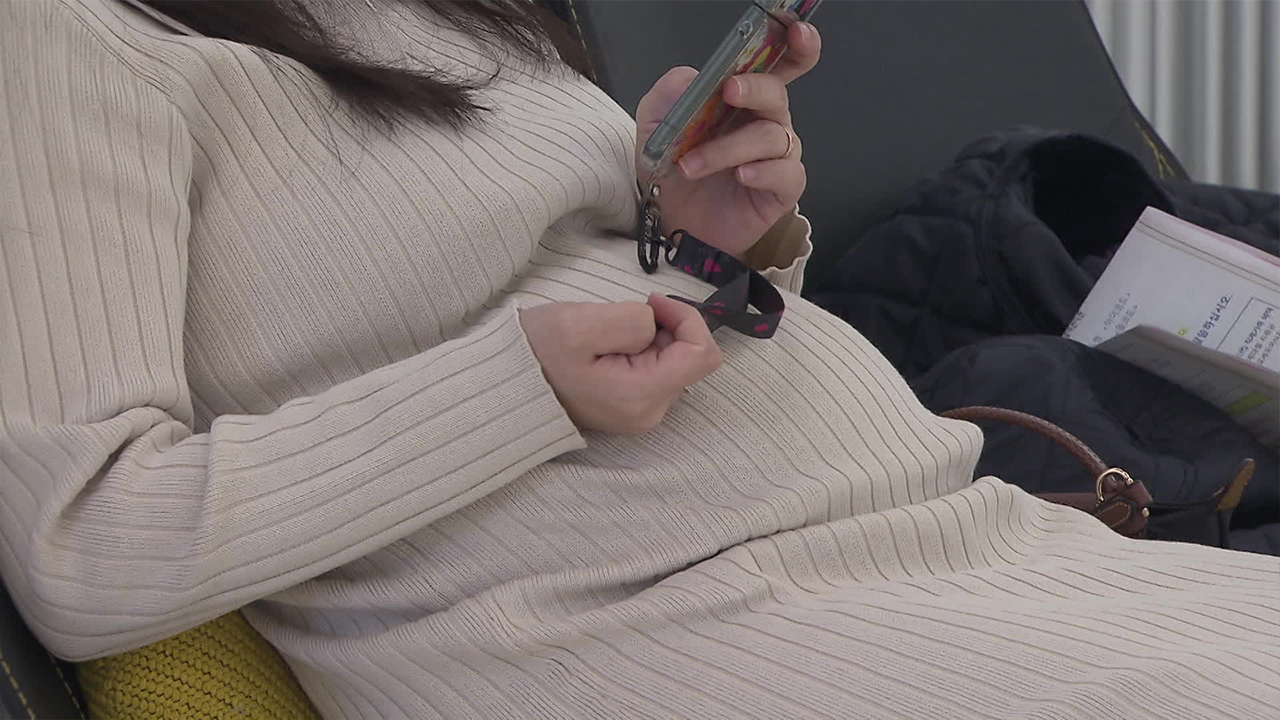Number of newborns rebounded in August: Can the total fertility rate recover from historic lows?
입력 2024.10.24 (00:03)
읽어주기 기능은 크롬기반의
브라우저에서만 사용하실 수 있습니다.
[Anchor]
The number of newborns in August increased by nearly 6% compared to a year ago.
This marks a welcome record of two consecutive months of rising birth rates, and there are expectations that the total fertility rate, which was anticipated to hit a record low this year, may see a slight rebound.
Reporter Kim Jin-hwa has the story.
[Report]
At an obstetrics and gynecology hospital in Gyeonggi Province, the number of pregnant women visiting the hospital before giving birth has increased by about 20% compared to a year ago.
Recently, some mothers had to wait to secure a hospital room.
[Kim Ui-hyuk/Chief of Obstetrics and Gynecology at CHA Ilsan Medical Center: "Older mothers are coming in more these days. It seems that the number of mothers has increased by about 20-30% compared to last year."]
The increase in the number of newborns is also reflected in the statistics.
In August, 20,098 babies were born.
This is an increase of over 1,100, nearly 6% more than a year ago.
After 18 consecutive months of decline, the number of newborns rebounded in April and May this year, saw a slight drop in June, but increased for two consecutive months in July and August.
[Lim Young-il/Head of Vital Statistics Division at Statistics Korea: "Marriages are now leading to births, and the continued decline in the number of newborns has had a base effect, which has now resulted in an increase."]
There are also expectations that the annual number of newborns this year may record an increase for the first time in nine years.
As of August this year, the cumulative number of newborns is 158,000, which is 0.4% lower than a year ago, narrowing the gap.
The total fertility rate for this year is also expected to improve to 0.74, rather than the historically low 0.68 previously projected by Statistics Korea.
[Kim Sang-yong/Economic Analyst at the National Assembly Budget Office: "When looking at the number of expected deliveries from applicants for the National Health Insurance's pregnancy and childbirth medical expense program, the number of expected deliveries this year has increased compared to 2023."]
The number of marriages, which is considered a leading indicator of childbirth, also increased by 20% in August compared to a year ago, continuing a five-month upward trend.
This is KBS News, Kim Jin-hwa.
The number of newborns in August increased by nearly 6% compared to a year ago.
This marks a welcome record of two consecutive months of rising birth rates, and there are expectations that the total fertility rate, which was anticipated to hit a record low this year, may see a slight rebound.
Reporter Kim Jin-hwa has the story.
[Report]
At an obstetrics and gynecology hospital in Gyeonggi Province, the number of pregnant women visiting the hospital before giving birth has increased by about 20% compared to a year ago.
Recently, some mothers had to wait to secure a hospital room.
[Kim Ui-hyuk/Chief of Obstetrics and Gynecology at CHA Ilsan Medical Center: "Older mothers are coming in more these days. It seems that the number of mothers has increased by about 20-30% compared to last year."]
The increase in the number of newborns is also reflected in the statistics.
In August, 20,098 babies were born.
This is an increase of over 1,100, nearly 6% more than a year ago.
After 18 consecutive months of decline, the number of newborns rebounded in April and May this year, saw a slight drop in June, but increased for two consecutive months in July and August.
[Lim Young-il/Head of Vital Statistics Division at Statistics Korea: "Marriages are now leading to births, and the continued decline in the number of newborns has had a base effect, which has now resulted in an increase."]
There are also expectations that the annual number of newborns this year may record an increase for the first time in nine years.
As of August this year, the cumulative number of newborns is 158,000, which is 0.4% lower than a year ago, narrowing the gap.
The total fertility rate for this year is also expected to improve to 0.74, rather than the historically low 0.68 previously projected by Statistics Korea.
[Kim Sang-yong/Economic Analyst at the National Assembly Budget Office: "When looking at the number of expected deliveries from applicants for the National Health Insurance's pregnancy and childbirth medical expense program, the number of expected deliveries this year has increased compared to 2023."]
The number of marriages, which is considered a leading indicator of childbirth, also increased by 20% in August compared to a year ago, continuing a five-month upward trend.
This is KBS News, Kim Jin-hwa.
■ 제보하기
▷ 카카오톡 : 'KBS제보' 검색, 채널 추가
▷ 전화 : 02-781-1234, 4444
▷ 이메일 : kbs1234@kbs.co.kr
▷ 유튜브, 네이버, 카카오에서도 KBS뉴스를 구독해주세요!
- Number of newborns rebounded in August: Can the total fertility rate recover from historic lows?
-
- 입력 2024-10-24 00:03:21

[Anchor]
The number of newborns in August increased by nearly 6% compared to a year ago.
This marks a welcome record of two consecutive months of rising birth rates, and there are expectations that the total fertility rate, which was anticipated to hit a record low this year, may see a slight rebound.
Reporter Kim Jin-hwa has the story.
[Report]
At an obstetrics and gynecology hospital in Gyeonggi Province, the number of pregnant women visiting the hospital before giving birth has increased by about 20% compared to a year ago.
Recently, some mothers had to wait to secure a hospital room.
[Kim Ui-hyuk/Chief of Obstetrics and Gynecology at CHA Ilsan Medical Center: "Older mothers are coming in more these days. It seems that the number of mothers has increased by about 20-30% compared to last year."]
The increase in the number of newborns is also reflected in the statistics.
In August, 20,098 babies were born.
This is an increase of over 1,100, nearly 6% more than a year ago.
After 18 consecutive months of decline, the number of newborns rebounded in April and May this year, saw a slight drop in June, but increased for two consecutive months in July and August.
[Lim Young-il/Head of Vital Statistics Division at Statistics Korea: "Marriages are now leading to births, and the continued decline in the number of newborns has had a base effect, which has now resulted in an increase."]
There are also expectations that the annual number of newborns this year may record an increase for the first time in nine years.
As of August this year, the cumulative number of newborns is 158,000, which is 0.4% lower than a year ago, narrowing the gap.
The total fertility rate for this year is also expected to improve to 0.74, rather than the historically low 0.68 previously projected by Statistics Korea.
[Kim Sang-yong/Economic Analyst at the National Assembly Budget Office: "When looking at the number of expected deliveries from applicants for the National Health Insurance's pregnancy and childbirth medical expense program, the number of expected deliveries this year has increased compared to 2023."]
The number of marriages, which is considered a leading indicator of childbirth, also increased by 20% in August compared to a year ago, continuing a five-month upward trend.
This is KBS News, Kim Jin-hwa.
The number of newborns in August increased by nearly 6% compared to a year ago.
This marks a welcome record of two consecutive months of rising birth rates, and there are expectations that the total fertility rate, which was anticipated to hit a record low this year, may see a slight rebound.
Reporter Kim Jin-hwa has the story.
[Report]
At an obstetrics and gynecology hospital in Gyeonggi Province, the number of pregnant women visiting the hospital before giving birth has increased by about 20% compared to a year ago.
Recently, some mothers had to wait to secure a hospital room.
[Kim Ui-hyuk/Chief of Obstetrics and Gynecology at CHA Ilsan Medical Center: "Older mothers are coming in more these days. It seems that the number of mothers has increased by about 20-30% compared to last year."]
The increase in the number of newborns is also reflected in the statistics.
In August, 20,098 babies were born.
This is an increase of over 1,100, nearly 6% more than a year ago.
After 18 consecutive months of decline, the number of newborns rebounded in April and May this year, saw a slight drop in June, but increased for two consecutive months in July and August.
[Lim Young-il/Head of Vital Statistics Division at Statistics Korea: "Marriages are now leading to births, and the continued decline in the number of newborns has had a base effect, which has now resulted in an increase."]
There are also expectations that the annual number of newborns this year may record an increase for the first time in nine years.
As of August this year, the cumulative number of newborns is 158,000, which is 0.4% lower than a year ago, narrowing the gap.
The total fertility rate for this year is also expected to improve to 0.74, rather than the historically low 0.68 previously projected by Statistics Korea.
[Kim Sang-yong/Economic Analyst at the National Assembly Budget Office: "When looking at the number of expected deliveries from applicants for the National Health Insurance's pregnancy and childbirth medical expense program, the number of expected deliveries this year has increased compared to 2023."]
The number of marriages, which is considered a leading indicator of childbirth, also increased by 20% in August compared to a year ago, continuing a five-month upward trend.
This is KBS News, Kim Jin-hwa.
-
-

김진화 기자 evolution@kbs.co.kr
김진화 기자의 기사 모음
-
이 기사가 좋으셨다면
-
좋아요
0
-
응원해요
0
-
후속 원해요
0















이 기사에 대한 의견을 남겨주세요.